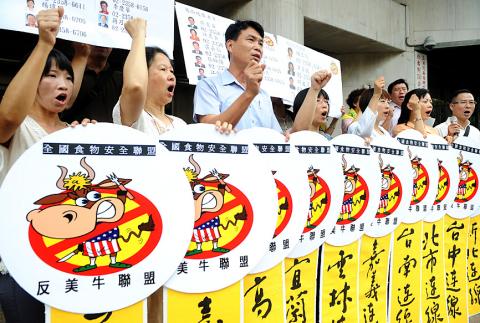The American Institute in Taiwan (AIT) and the Ministry of Foreign Affairs yesterday denied that the AIT was “menacing” Taiwan, as the Democratic Progressive Party (DPP) put it, by tying a resumption of trade talks under the Trade and Investment Framework Agreement (TIFA) to the US beef issue.
Whether Taiwan would allow imports of US beef containing residues of the leanness-enhancing animal feed additive ractopamine was an issue affecting relations between Taiwan and the US, AIT spokesperson Christopher Kavanagh said.
“To say that we are threatening [Taiwan], I think, no, clearly no,” Kavanagh said.

Photo: Chu Pei-hsiung, Taipei Times
Kavanagh also denied the DPP’s claims about an exchange of interests between Washington and Taipei in which the US nominated Taiwan as a candidate for its visa-waiver program three weeks before the January presidential election, according to the DPP, to boost President Ma Ying-jeou’s (馬英九) re-election chance in return for the Ma administration’s promise to lift the import ban.
“No, there is absolutely no relation between visa waiver and beef. Visa waiver is governed under US laws and a country has to meet requirements of the laws to move forward in the process. It has nothing to do with beef, absolutely nothing,” he said.
“But beef, we can say that it has been a stumbling block in our trade agenda with Taiwan. Beef was the only factor which thwarted our efforts to resume our TIFA talks in 2010 and in 2011 ... We hope to resume TIFA talks as soon as possible,” Kavanagh added.
Initiated by the Chinese Nationalist Party (KMT), several party lawmakers met with AIT Director William Stanton on Tuesday to get a better idea of how lifting the ban would benefit the country in the advancement of bilateral relations.
The lawmakers told the press that the US would resume TIFA talks once the beef issue is resolved and a resolution of the issue would facilitate Taiwan’s inclusion in the US’ visa-waiver program and participation in a regional trade bloc.
At a meeting of the legislature’s Foreign and National Defense Committee yesterday, DPP Legislator Tsai Huang-liang (蔡煌瑯) lambasted the US for what he said was Washington’s blatant intimidation by stalling the TIFA talks while the beef issue remains unresolved.
DPP Legislator Hsiao Bi-khim (蕭美琴) suspected a “backroom deal” between the Ma administration and the US as she said the government was “offering up the public’s health as a sacrifice” in exchange for progress on issues such as the visa waiver and TIFA negotiations.
In response, Deputy Minister of Foreign Affairs Tung Kuo-yu (董國猷) said the US did not pressure Taiwan to begin importing US beef containing residues of ractopamine and reiterated that the Ma administration has not made any promises to the US on the beef issue.

Alain Robert, known as the "French Spider-Man," praised Alex Honnold as exceptionally well-prepared after the US climber completed a free solo ascent of Taipei 101 yesterday. Robert said Honnold's ascent of the 508m-tall skyscraper in just more than one-and-a-half hours without using safety ropes or equipment was a remarkable achievement. "This is my life," he said in an interview conducted in French, adding that he liked the feeling of being "on the edge of danger." The 63-year-old Frenchman climbed Taipei 101 using ropes in December 2004, taking about four hours to reach the top. On a one-to-10 scale of difficulty, Robert said Taipei 101

Nipah virus infection is to be officially listed as a category 5 notifiable infectious disease in Taiwan in March, while clinical treatment guidelines are being formulated, the Centers for Disease Control (CDC) said yesterday. With Nipah infections being reported in other countries and considering its relatively high fatality rate, the centers on Jan. 16 announced that it would be listed as a notifiable infectious disease to bolster the nation’s systematic early warning system and increase public awareness, the CDC said. Bangladesh reported four fatal cases last year in separate districts, with three linked to raw date palm sap consumption, CDC Epidemic Intelligence

US climber Alex Honnold left Taiwan this morning a day after completing a free-solo ascent of Taipei 101, a feat that drew cheers from onlookers and gained widespread international attention. Honnold yesterday scaled the 101-story skyscraper without a rope or safety harness. The climb — the highest urban free-solo ascent ever attempted — took just more than 90 minutes and was streamed live on Netflix. It was covered by major international news outlets including CNN, the New York Times, the Guardian and the Wall Street Journal. As Honnold prepared to leave Taiwan today, he attracted a crowd when he and his wife, Sanni,

Taiwanese and US defense groups are collaborating to introduce deployable, semi-autonomous manufacturing systems for drones and components in a boost to the nation’s supply chain resilience. Taiwan’s G-Tech Optroelectronics Corp subsidiary GTOC and the US’ Aerkomm Inc on Friday announced an agreement with fellow US-based Firestorm Lab to adopt the latter’s xCell, a technology featuring 3D printers fitted in 6.1m container units. The systems enable aerial platforms and parts to be produced in high volumes from dispersed nodes capable of rapid redeployment, to minimize the risk of enemy strikes and to meet field requirements, they said. Firestorm chief technology officer Ian Muceus said